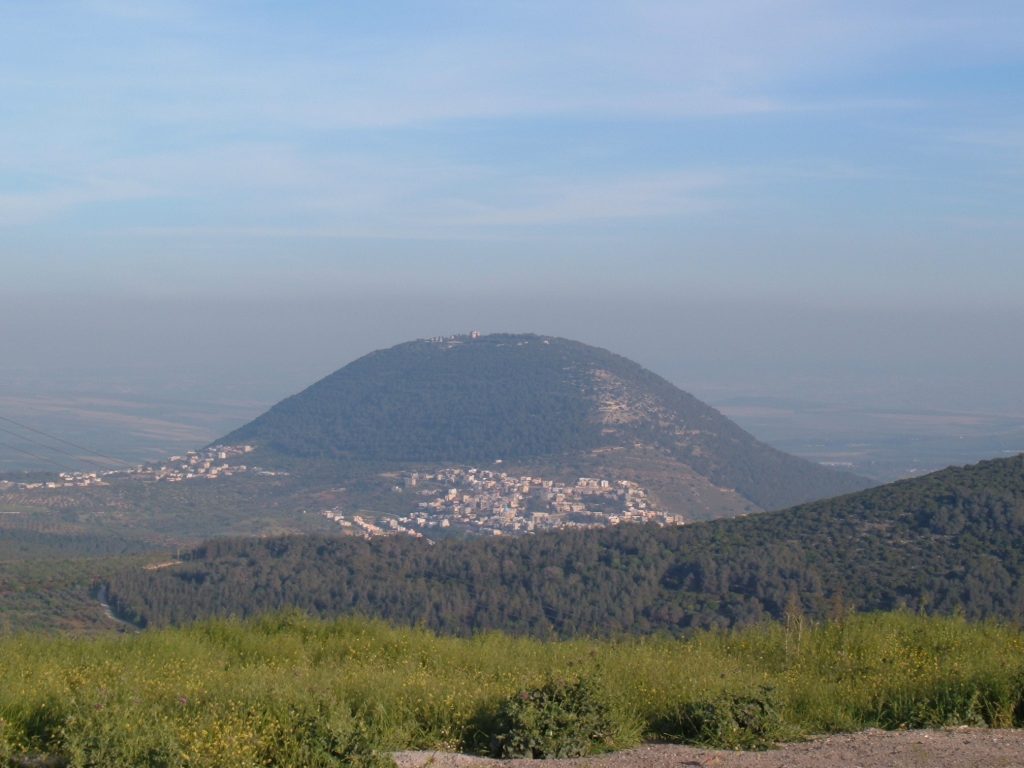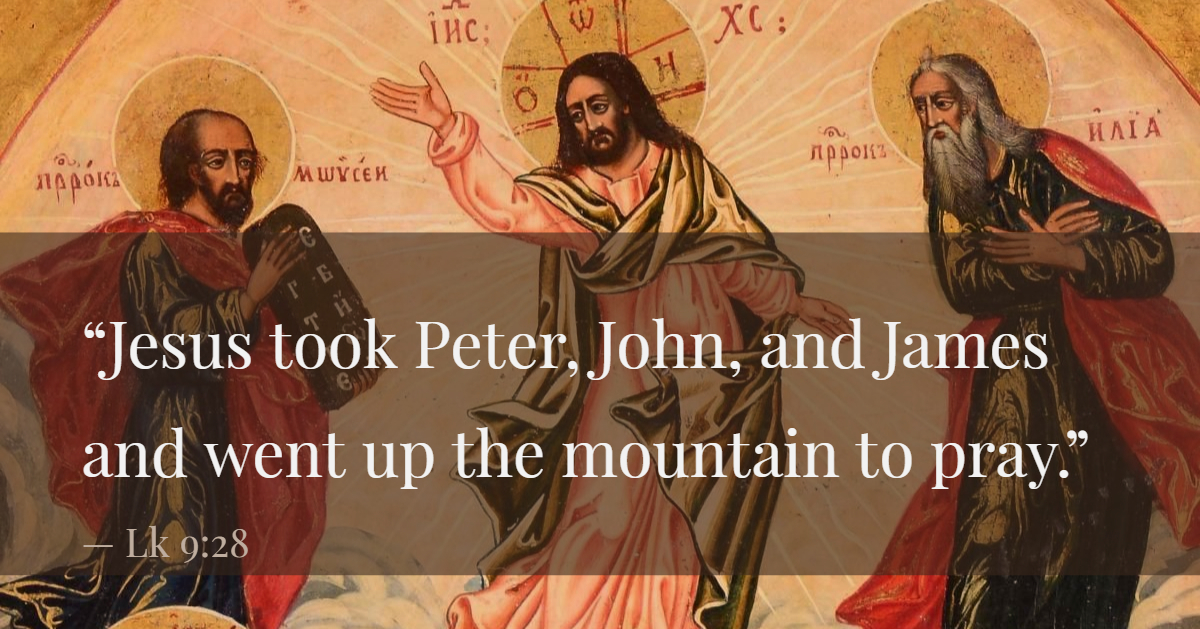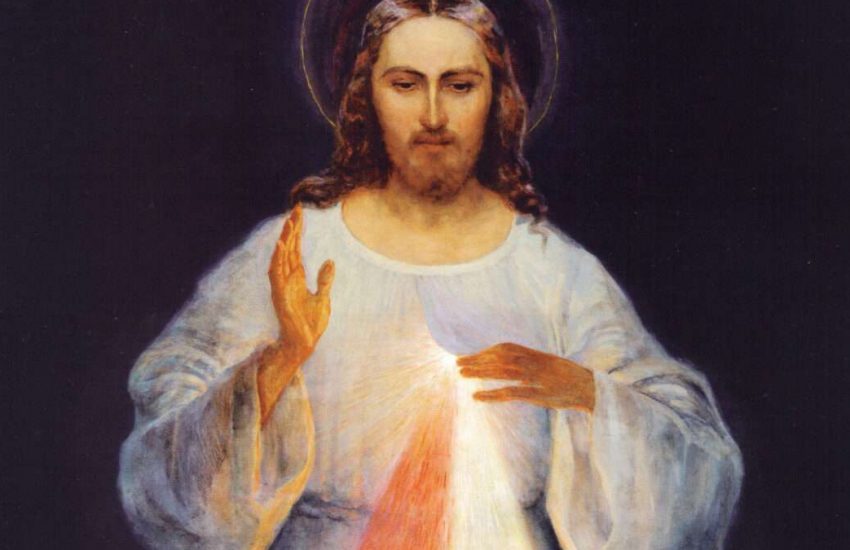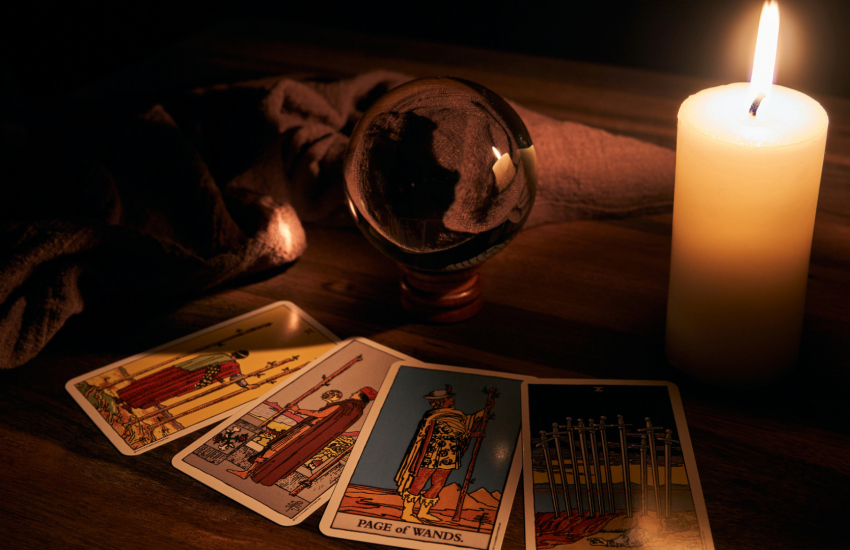Going Up the Mountain
2nd Sunday of Lent (C)
This Sunday our gospel is about the Transfiguration, when Jesus appeared in all his divine glory to Peter, James and John. As we continue with what might feel like the uphill climb of our Lenten penance, I want to focus on the very first line of this Sunday’s reading: “Jesus took Peter, John, and James and went up the mountain to pray” (Lk 9:28).
They went up the mountain to pray. Although it is not named in the scriptures, tradition has it that Jesus led Peter, James and John to the top of Mount Tabor. At only 1800 feet in elevation, it is not the highest mountain in Israel (Jerusalem itself sits at nearly 2500 feet), but because Tabor rises up steeply from the plains around it, it presents a very dramatic appearance. It’s a rather steep trek from the bottom to the top.

You can just make out in the above image the Basilica of the Transfiguration located at the top of the mountain. I visited Tabor during my pilgrimage to Jerusalem last December. To get to the basilica, we had to leave our bus at the bottom of the mountain and drive up in smaller vans, because the bus was too large to navigate the 18 hairpin curves in the steep road leading to the top.
As we rounded each harrowing curve, I thought about Jesus leading Peter, James and John up this mountain by foot. It must have been a work out! The closest thing I can compare it to from my own experience is hiking Pinnacle Park here in Jackson County. That trail has an 1800′ elevation gain over 3.5 miles. You are definitely exhausted by the time you reach the top.
So Peter, James and John were no doubt tired, sweaty, and thirsty as they followed Jesus further and further up Mount Tabor. And there is no indication that Jesus told them why he was leading them up there. I could imagine Peter saying, “Lord, what is it that you wanted to show us that you couldn’t show us from the bottom?”
What Jesus wanted to show them was heaven.
When they reached the top, our gospel says they prayed. And as they prayed, Jesus was transfigured before them. His appearance changed as his divine glory shone forth. And he was not alone. Moses and Elijah appeared with him. These two figures from the Old Testament represent the Law and the Prophets, both of which are fulfilled in Christ. Then God’s voice was heard saying, “This is my chosen Son; listen to him” (Lk 9:35).
Peter, John and James found themselves in the company of God and the saints. For a while, they experienced heaven on earth. That’s what Jesus took them up the mountain to show them. That was the reason for their long and difficult journey.
Luke’s gospel tells us that Jesus took them to the mountain to witness his transfiguration after he told them of his coming Passion. Perhaps it was our Lord’s way of assuring them that the very difficult journey — the via dolorosa — that he would soon have to make would also be worth it in the end.
Our Citizenship is in Heaven
We are pilgrims on a journey. As St. Paul reminds us in our second reading, “Our citizenship is in heaven” (Phil 3:20). We don’t belong here. Our home is elsewhere. We yearn to be with God because that’s what (Who) we were made for.
We hear this longing expressed in the Psalms. This Sunday’s psalm says, “Your presence, Lord, I seek” (Ps 27:8). Another psalm says, “For you my body yearns; for you my soul thirsts” (Ps 63:2). Yet another asks, “When can I enter and see the face of God?” (Ps 42:3). We long for God as our final end, and Lent is a time for us to reconnect with that longing.
If our Lenten penances feel like an uphill climb, then good. Breaking away from our attachments to this world takes effort. But it’s not a pointless struggle. It’s not a climb to nowhere. Lent is our journey up Mount Tabor so we can also see Christ’s glory.
Sometimes people say, “It’s about the journey, not the destination.” That might be good advice if you want to take a leisurely stroll, but not if you want to actually get somewhere. No one hikes Pinnacle Park because they like walking on steep, rocky trails. They do it for the majestic view from the top. Jesus didn’t take Peter, James and John up the mountain for the exercise. He took them there to show them his glory. And we don’t undertake Lenten penances for the sake of self-improvement. We do them because they can help us get to heaven.
By climbing the mountain, Jesus was literally raising Peter, James and John above the distractions of the world. He was taking them into the wilderness, into a place of silence and mystery. We also need to detach ourselves from the things of this world and enter into the silence and mystery of our faith.
St. Paul writes about those whose “god is their stomach” and whose “minds are occupied with earthly things” (Phil 3:19). Our Lenten observances are meant to help us overcome these worldly inclinations so that we can instead be occupied with the things of heaven; with truth, beauty and goodness. The things we fast from, the additional prayers and works of charity that we take on, should all be helping us to do what God tells us in today’s gospel: “This is my chosen Son; listen to him” (Lk 9:35).
Our Lenten penance might feel like a rocky, uphill climb; but we have to remember what we are doing it for. Remember, when Peter, John and James walked up Mount Tabor, they were following Jesus. So must we. If we aren’t following Jesus on our uphill climb of Lent, we’ll only end up tired and lost.
The Purpose of Penance
One of the Catholic pages I follow on Facebook posted an interesting question recently: If you gave up chocolate for Lent, is it making you long for Christ, or just long for chocolate?
As we enter the second week of Lent, let’s be mindful that our Lenten practices are not about self-punishment or self-improvement, but about drawing us closer to Christ. Are they doing that? If the answer is no, then we either need to either change our penance or change our attitude.
Lent is not about the journey. It’s about the destination. The point of climbing a mountain is to get to the top. Let us, like Peter, James and John, follow Jesus on our trek toward heaven, so that we might say along with them, “Master, it is good that we are here” (Lk 9:38).



